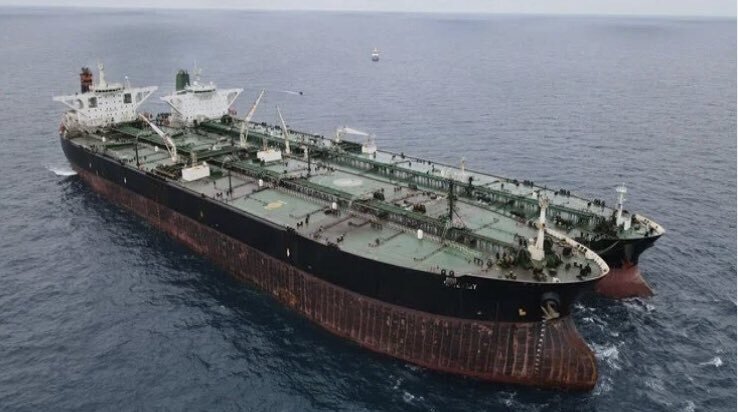Iran embassy in UK rejects reports of insecurity in Gulf of Oman

TEHRAN – Iran’s Embassy in the UK has reacted to Western press reports on alleged incidents involving a number of ships off the coast of the United Arab Emirates in the Gulf of Oman, saying there were no new incidents in the region.
The embassy’s reaction came after several Western news organizations reported that a number of ships in the Gulf of Oman were affected by unspecified incidents.
First, a group called United Kingdom Maritime Trade Operations (UKMTO) reported Tuesday that a vessel near the UAE port of Fujairah was affected by a non-piracy incident. The Associated Press reported that at least four ships off the coast of the United Arab Emirates broadcast warnings on Tuesday that they had lost control of their steering under unclear circumstances as authorities reported “an incident” was underway in the area. It wasn't immediately clear what was happening off the coast of Fujairah in the Gulf of Oman.
The vessels — oil tankers called Queen Ematha, the Golden Brilliant, Jag Pooja and Abyss — announced around the same time via their Automatic Identification System trackers that they were “not under command,” according to MarineTraffic.com.
Iran was quick to warn about an unfair game intended to ramp up pressure on it. The Iranian embassy in London said it had direct links in the Persian Gulf and it was informed that there were no incidents taking place in the Gulf of Oman.
It said the whole episode was an unfair game designed to extract concessions from Iran.
“According to our direct links in the Persian Gulf region, no information on new incidents for any merchant ship in the region is confirmed so far. Misleading the public all around the world for diplomatic gain in New York is not fair game,” the embassy said on Twitter.
Iran’s Foreign Ministry spokesman Saeed Khatibzadeh described as totally suspicious the reports of successive security incidents involving vessels in the Persian Gulf and the Sea of Oman, warning against any effort to create a vicious atmosphere to pursue certain political goals.
Khatibzadeh at the same time reaffirmed Iran’s policy of establishing security and stability in the Persian Gulf and the Gulf of Oman, and said Iranian naval forces are prepared to provide support, if needed, to vessels that send distress signals while passing through the strategic waters of the region.
“In case of problems in navigation systems, the Islamic Republic of Iran is ready to provide assistance and investigate the matter closely,” he added, according to a statement by the Iranian Foreign Ministry.
He further expressed Iran’s preparedness to cooperate with the regional countries to boost maritime security and monitoring of naval transit routes.
In a separate interview with Tasnim on Tuesday night, Khatibzadeh dismissed rumors about the entry of Iranian military forces into foreign ships passing in the Persian Gulf and the Sea of Oman, warning against such false reports propagated by the Western and Zionist media.
The comments came after the UK sources reported the “potential hijack” of a British vessel off the coast of the United Arab Emirates’ Fujairah region.
British authorities claimed that the Panama-flagged Asphalt Princess oil tanker had been hijacked, and said they were “working on the assumption Iranian military or proxies boarded the vessel” in the Gulf of Oman.
Khatibzadeh categorically rejected as “untrue” the reports circulated by Western and Israeli media about the involvement of Iran’s Armed Forces in the incident, Press TV reported.
The Iranian Foreign Ministry spokesman also called on all parties to be vigilant against the spread of fake news, given the contradictory news about maritime security in the region.
Earlier, Iranian Ambassador to the UK Mohsen Baharvand cautioned that an escalation “doesn’t help anybody.” He told the Financial Times that London’s decision to blame the Islamic republic for last week’s assault on the MV Mercer Street was a “very premature reaction.”
Iran and the UK both summoned each other’s ambassadors amid heightened tensions over the attack on the Israeli ship.
The Israeli-operated ship Mercer Street came under attack off the coast of Oman on July 29 while traveling from Dar es Salaam in Tanzania to the United Arab Emirates port of Fujairah. The oil tanker, managed by Israeli shipping magnate Eyal Ofer’s Zodiac Maritime, was reportedly attacked by suicide drones. Zodiac Maritime said two crewmen, a British and Romanian national, died in the attack.
“With profound sadness, we understand the incident onboard the M/T Mercer Street on 29 July, 2021 has resulted in the deaths of two crew members on board,” the UK-based Israeli company said in a statement on Friday afternoon, a day after the attack.
Israel, the U.S. and the UK blamed Iran for the attack without presenting any evidence to support their accusations.
Israeli Prime Minister Naftali Bennett claimed that Tel Aviv knows with certainty Iran attacked the Mercer Street ship and will respond to it.
“I determine, with absolute certainty – Iran carried out the attack against the ship,” Bennett stated, according to the Jerusalem Post. “The intelligence evidence for this exists and we expect the international community will make it clear to the Iranian regime that they have made a serious mistake.”
London also summoned the Iranian ambassador to the UK. “The Iranian Ambassador to the UK, Mohsen Baharvand, was summoned today to the Foreign, Commonwealth & Development Office by the Minister for the Middle East, James Cleverly, in response to the unlawful attack committed on MV Mercer Street on 29 July,” the UK Foreign Office said in a statement.
Iran responded by summoning the British charge d’affaires in Tehran, in the absence of the country's ambassador, to protest the anti-Iran accusations leveled by the British foreign secretary.
